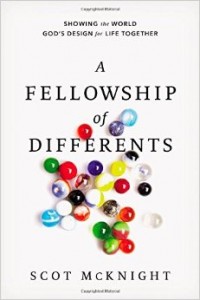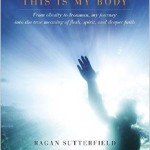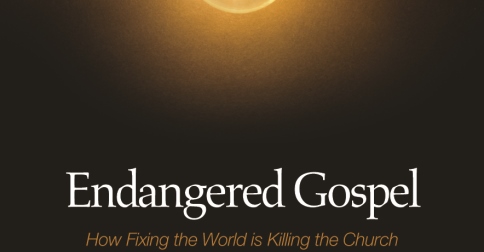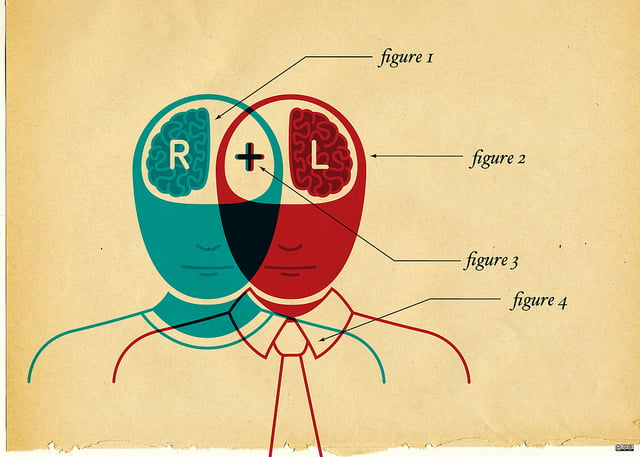A Fellowship of Differents:
Showing the World God’s Design for Life Together
Scot McKnight
Hardback: Zondervan, 2015
[ This post is part of the Patheos Book Club]
In the Slow Church book, John and I write:
Let’s pause for a moment to consider the great diversity of God’s creation. Limiting our focus to Earth—just one of an estimated 100 billion planets in the Milky Way, which is itself just one of at least 175 billion galaxies in the universe—and limiting ourselves even further to dry land, think of the brilliant variety of landscapes, climates, peoples, languages and cultures. Think of the natural diversity in your own backyard. … The diversity of creation is evident at even the smallest levels. A single teaspoonful of healthy garden soil can contain thousands of species, millions of organisms and up to a hundred meters of fungal networks. Healthy soil is so abundantly manifold that only about 1 percent of soil microorganism species have even been identified.
The mission of God in the world is centered on the redeeming and reconciling of a diverse creation. How does God intend to accomplish this reconciliation? One of the great flaws of McDonaldization is its preference for generic, one-size-fits-all solutions. A restaurant chain is more efficient, more predictable and easier to control, and its successes and failures will be easier to quantify, if every restaurant is identical in its architecture and operations. But the more we consider the wonderful diversity of God’s creation, the more skeptical we must become about the possibility of universal solutions. God is reconciling all creation, but this reconciliation unfolds in a manner that is attentive to, not dismissive of, diversity. Specifically, it is embodied by faith communities of all stripes whose members are being reconciled to God, to one another and to their neighbors.
In his excellent new book A Fellowship of Differents, Scot McKnight explores the crucial role that diversity should play in the church. Drawing primarily upon the life and work of the Apostle Paul, McKnight makes a case that our churches should reflect (in some way or another) the diversity of God’s creation. In agriculture, humankind is coming to realize how deeply unhealthy monoculture farms (i.e., those that grow only a single crop) are to the land and to waterways. In contrast, on a polyculture farm, a wise farmer can find ways to make diverse crops and livestock work together for not only the flourishing of the farm, but also the health and well-being of land and waterways. This illustration from agriculture parallels the thesis of McKnight’s book: that churches thrive and function most healthfully when comprised of diverse members whose shared life serves to offer care and support not only for its members but also for neighbors as well, a reflection of the love and reconciliation that God has made available to humanity through Jesus.
If you have read Slow Church, and want another book that makes a similar theological case, and one that is wisely attentive to biblical scholarship, A Fellowship of Differents is your book. A fitting sequel to the local ecclesiology that he introduced in his recent book Kingdom Conspiracy, McKnight begins with the bold proclamation that:
Everything I learned about the Christian life I learned from my church. I will make this a bigger principle: a local church determines what the Christian life looks like for the people in that church. Now I’ll make it even bigger still: we all learn the Christian life from how our local churches shape us. (15)
From these proclamations, McKnight hones in on the central two questions that he wants to explore here:
1) What is the church supposed to be?
2) If the church is what it is supposed to be, what does the Christian life look like?
McKnight emphasizes that diversity is at the heart of what God intends the church to be, and he is clear that he is not talking merely about racial diversity, but rather diversity across a wide range of factors. He asks the questions:
We should see different genders, socioeconomic groups, races, cultures, music styles, artistic styles, moral histories, forms of communication, ages involved, marital status, at church. Do we?
What Scot McKnight offers in A Fellowship of Differents is a rich vision of the diverse community that the church should be, and why we should be so. At points throughout the book, I did wish for more reflection on how largely homogeneous church communities, could start to embrace this biblical vision of diversity, and be transformed by it. Regardless, this is one of the most accessible and important books in print on our calling as the church.













